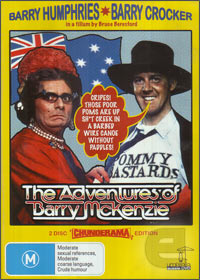
THE ADVENTURES OF BARRY Mc KENZIE
Australia, 1972, 114 minutes, Colour.
Barry Crocker, Barry Humphries, Peter Cook, Spike Milligan, Dick Bentley.
Directed by Bruce Beresford.
Is the Australian male a rough, insensitive, foul-mouthed, beer-swilling boor? asks Joan Bakewell on BBC-TV in this farce version of Barry Humphries' comic strip. The evidence offered suggests, generally, yes.
Superior to the Carry Ons (with which it shares much subject matter), the film clearly satirises the English and, less constantly, the Aussie image. Bazza (could he possibly come from Maroubra?) with his cocky hat and straight-forward naivety is both likeable and repellent. We have mixed feelings - but generally pro Bazza. Barry Humphries, however, as Aunty Edna Everage is a hilariously convincing comic. (Sensitive audiences will not like all that comes from the mouth of Bazza.)
1. Was this an enjoyable film? Was it a film equivalent of the original cartoons? How much did the film presuppose a knowledge and liking for the Barry Mc Kenzie cartoons? Did the film aim at any portrayal of character or did it simply communicate the cartoon caricatures? How legitimate is this? How enjoyable?
2. How Australian was the film? As a portrayal of Australian characters? Of Australian mores? Australian styles? How exaggerated? How did it appear to Australian audiences? To English audiences? To overseas audiences?
3. How interesting a character was Barry Mc Kenzie? How significant were his adventures? The contrast between Australia and England in him? His naivety and the clashes of culture? His vulgarity and yet his innocence? His naive crudity and ordinariness? His hat, his beer, his vocabulary, his presuppositions about sex? How much maturity?
4. How interesting a character was Edna Everage? Seeming innocence and respectability, yet underneath, smoldering suggestion and arrogance and snobbery? How much satire is there in the portrayal of Edna Everage? What Australian virtues does she represent (if any)? What Australian hypocrisies does she present? How successful a satiric and comic character is she?
5. Does Barry McKenzie's background explain him - the sequences in Sydney, the Maroubra background etc?
6. Comment on the presentation of Curly and the Australians at Earl's Court. Their customs, their drinking, vocabulary, attitude towards the English? As parasites and bludgers?
7. How much of the film was a satire on the English? Especially in the visit to the Gorts? How typical the Gorts as an English family, or a caricature? Mrs Gort and her ambitions for her daughter, the awkward daughter, the 'kinks' of the father? The humour of the dance? The satirical implication of the gifts and the plots for marriage?
8. The significance of the sequence with the hippies? The using of Barry, the esoteric nature of the hippies, the contracts and the fights? Again satire on the English?
9. The sequence between Barry and the psychologist? The irony on psychology, the vulgarity of the vomiting?
10. The irony and the satire with Spike Milligan as the landlord?
11. The presentation of the TV world - the commercial of 'High Camp', the actress and the seduction, Dominic and his frantic work at the TV station?
12. The presentation of Lesley as Gaylene and her friend Claude? The bizarre sexual overtones of this? The change in Australians abroad as regards sexuality? The relationship of Claude and Auntie Edna?
13. The significance of the interview with Barry and the irony of his being chosen to represent Australian culture? The satire on the English here? The satire on the Australians? The vulgarity of Barry's replies, the exposing of himself, and the putting out of the fire by the friends? Did this remain within the bounds of taste?
14. The satire on the detective, how humorous?
15. What did the whole film add up to in terms of enjoyment and in terms of satire?